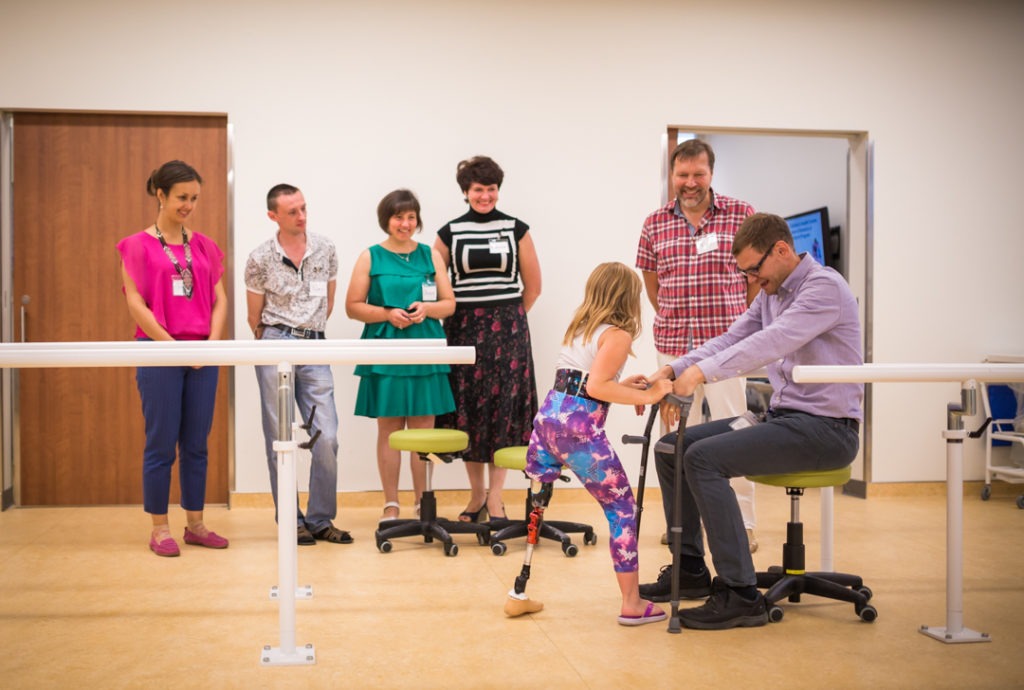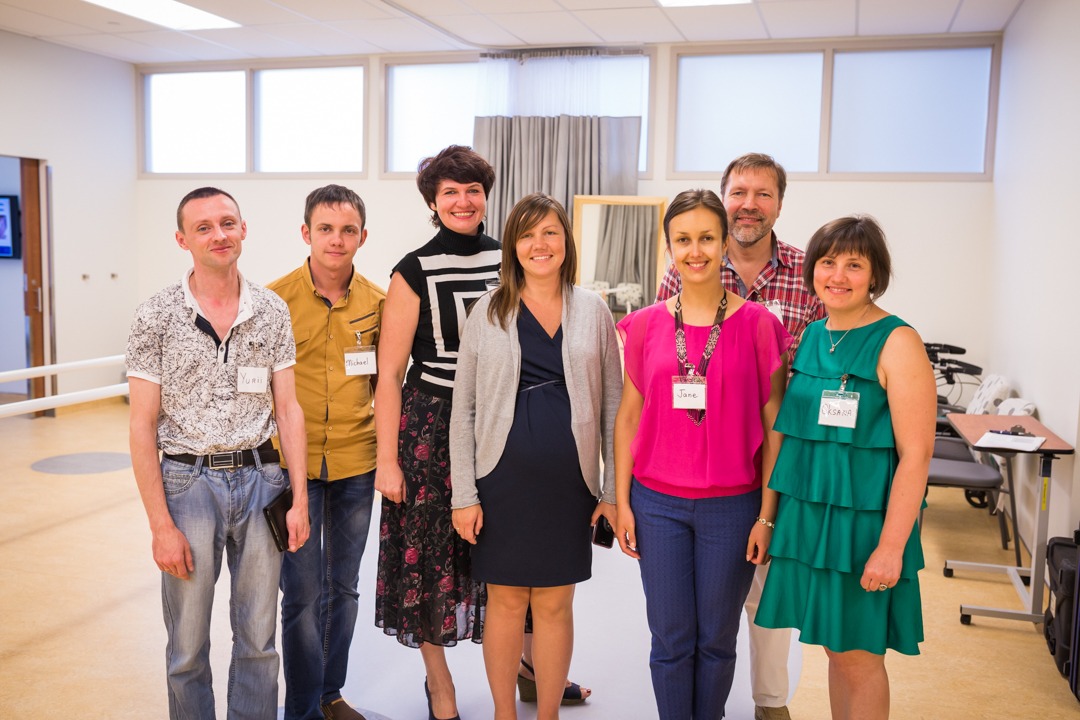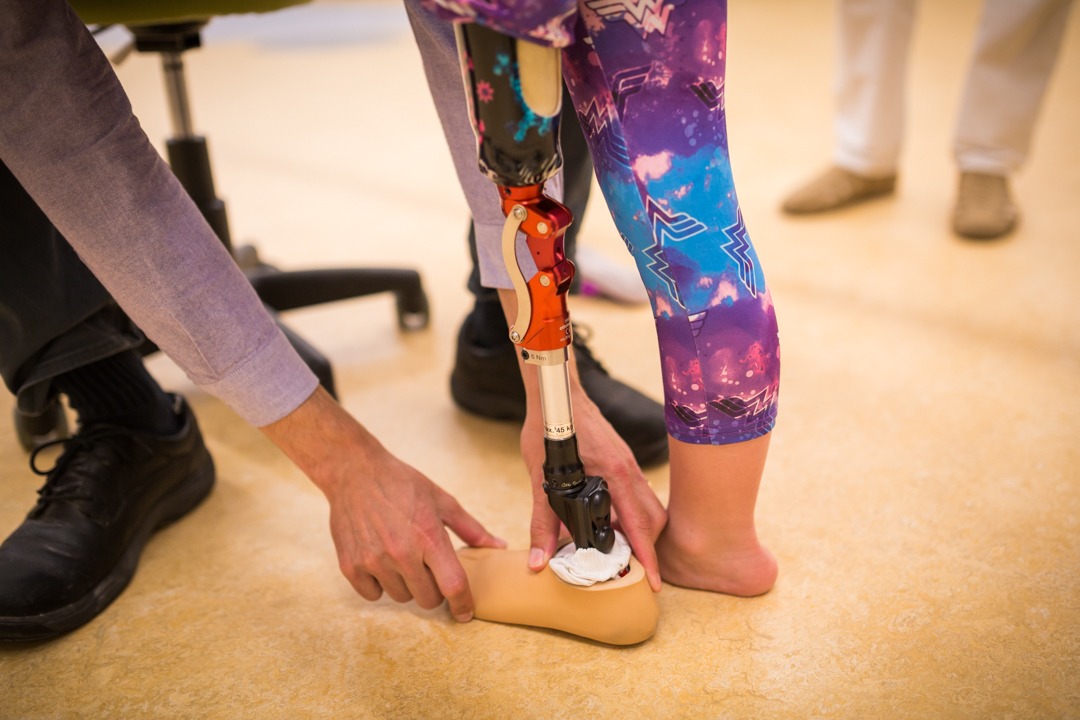
Global knowledge sharing in Prosthetics and Orthotics
A need in Ukraine
As the conflict in Eastern Ukraine escalates, soldiers and civilians are being injured in blasts. Their irregular injuries sometimes require complex amputations and devices to match.
Ukrainian prosthetists are seeing more involved cases and many of them. They’re seeking expertise on how to provide better care to these patients.
This summer, a group of five specialists from Ukraine travelled to Hamilton with the Ukraine Prosthetic Assistance Project to visit the Hamilton Health Sciences’ (HHS) Prosthetics and Orthotics (P&O) Department and Amputee Rehabilitation team to learn from its multidisciplinary approach to patient care.
“They are focused on assisting our patients to achieve the highest level of functional independence possible.”
The multidisciplinary method
HHS’ P&O Department is one of the largest in Canada. It prides itself on providing complete care by involving a multidisciplinary team at every step at the process. Patients meet with physiotherapists, occupational therapists and nutritionists among many other specialists. This team approach ensures maximal recovery and rehabilitation. Dr. Sharon Grad, medical director of the Amputee Rehabilitation Program at HHS sees first hand how this dynamic positively affects outcomes.

“We have an extremely dedicated group of health care professionals,” says Dr. Grad. “They are focused on assisting our patients to achieve the highest level of functional independence possible.”
Though the prosthetic industry in Ukraine is fairly developed, not all clinicians are able to work on the complex blast injuries that they are seeing more frequently. As a result, some patients have been sent abroad to have prosthetics fitted. Many have returned without an appropriate follow up plan in place for their care. In shadowing the P&O team at HHS, the Ukrainian visitors were able to learn strategies for integrating different stages of care to build a cohesive plan.
Seeking knowledge to bring back home
Yuri Yaskiv is one of the prosthetists who travelled to Hamilton from Ukraine. He hopes to implement some of HHS’ multidisciplinary strategies back home.
“This tells me that there is good communication as to what is expected of every specialist at every stage of patient care.”
“I was really impressed with the collaboration between doctors, physiotherapists, and prosthetists,” says Yaskiv. “A patient with diabetes whose lower limb was amputated was able to start testing his prosthesis four months after surgery, because the stump was properly done surgically and taken care of. In Ukraine in most cases patients who have diabetes do not have a good stump even a year following the surgery.
“This tells me that there is good communication as to what is expected of every specialist at every stage of patient care. We really need to start borrowing this multidisciplinary approach and implementing it in Ukraine.”
Whether a patient has received an amputation due to a blast injury or complications from diabetes, the way their stump heals can greatly affect their comfort and rehabilitation. The P&O team at HHS becomes involved early on in these cases to make sure the patient’s healing process aligns with their plans for a prosthetic device. Grad emphasizes that this integrated approach is key to the success of HHS’ program. “I hope the health professionals from the Ukraine were able to appreciate the amount of teamwork necessary to successfully run a prosthetics program,” says Grad. “I think they realized how the prosthetists at HHS are an integral part of our team.”

Building a lasting connection
Antonina Kumka, a Hamilton resident and president of the Canada-Ukraine International Assistance Fund helped to coordinate the visit with funding from the Save Lives Together Foundation. She believes the visiting professionals gained invaluable knowledge and experience that they will be able to integrate into practice back home.
“such exchanges are invaluable for making amputee care in Ukraine sustainable and first-class.”
“We are very grateful to Hamilton Health Sciences’ Prosthetics and Orthotics Department for giving us the opportunity to invite the Ukrainian specialists here, to Hamilton,” says Kumka. “As we are trying to build capacity within the prosthetic industry in Ukraine, such exchanges are invaluable for making amputee care in Ukraine sustainable and first-class.”
They returned home invigorated with new ideas and the knowledge to implement them. HHS’ P&O Department provided its visitors with information and tools to assist with future patient assessments. The Hamilton team is hopeful that its members can continue not only to act as a resource for the Ukrainian specialists, but learn from them as well.
“I hope they will continue to communicate with us in the future,” says Grad, “to share their ideas and questions that will enhance not just their clinical management of patients, but ours as well.”
